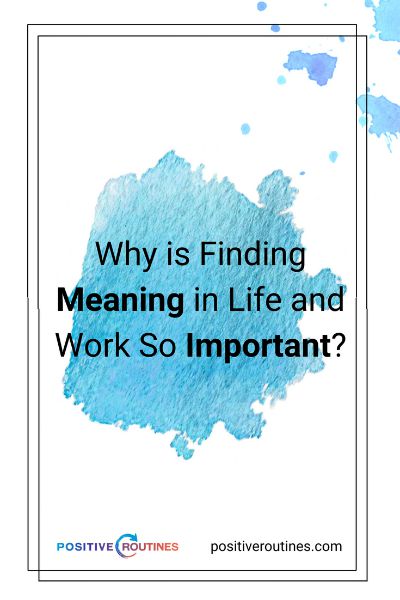Society tells us that success is the key to happiness, but we all know now, that’s wrong. The alternate approach—and the one we usually take around here—flips that perspective on its head. While we know happiness matters in a big way, we felt like we were missing something. What if the starting point is deeper than that? …which brings us to meaning. It turns out that finding meaning is just as important to your well-being as finding happiness. In fact, it might be even more so. Because finding meaning in life can lead to long-lasting and consistent happiness, better relationships, and maybe even a job you love. Yeah, it’s that powerful.
Let’s take a look at what meaning means, why it’s so important in the first place, and a few ways to tap into it in the workplace and beyond.
What’s the Difference Between Happiness and Meaning?

They seem similar, right? That’s because they are. But there are critical differences. In order to make the distinction, we need to know what both meaning and happiness actually mean.
Happiness, according to positive psychology researchers, is a positive state of well-being that can be short or long-term. And it can apply to both small and big things. For example, you can feel happy that your coffee is hot or you can feel happy that you have people who love you. The overall feeling of happiness is the same.
On the other hand, meaning is the idea that your life has a purpose and is valuable, to both yourself and others. It’s the feeling that your life is rewarding, that it matters in some way.
Both are essential to having a good life overall, but you probably focus a lot less on meaning than happiness. We’re here to tell you why that matters and then help you work on finding meaning and purpose in your life and in your career.
The Importance of Finding Meaning in Work

So why is it so important to find meaning in your work? After all, it’s just a job, right? Well, it’s a little more than that. Your job is where you spend the majority of your time and energy, so if you can turn it into something that adds meaning and purpose, you get benefits that reach beyond your office. Benefits like being happier, doing better at your job, and improving your life overall.
Additionally, finding meaning in your work is one of the best ways to feel satisfied with your job, according to findings from The Energy Project and Harvard Business Review. And if you spend as much time at the office as most Americans do, you could benefit from a little satisfaction. Here are three ways that finding meaning in your work can benefit you.
- Increase your engagement level: Aside from helping the day go by faster, research suggests that higher levels of work engagement help prevent burnout and depressive symptoms.
- Boost your performance: Unsurprisingly, people perform better when their needs are met, and doing meaningful work is one of those needs for many people. Research has found that people who take more meaning from their work generally perform better at their jobs. This is especially true when you have supportive leaders.
- Add meaning to your entire life: If you want a more meaningful life, research shows that creating meaning in your work is a great way to do that. It may not be the full answer, but it can put you on the right track.
The Importance of Finding Meaning in Life

And that brings us to the bigger question: Why is it important to find meaning in life? Here are three ways meaning matters:
- Increase your psychological health and well-being: It’s good for our mental health to feel like we’re doing something that matters, says research. And that’s important.
- Give your life balance: We all know how it feels to be short on time and long on work hours. We cut out time with important people, slack on exercise, ditch our hobbies, and become monsters. Alright, that’s an exaggeration, but truthfully, we get way out of sorts. The process of finding what’s meaningful to you can help you achieve the ultimate life goal: balance. Once you know what gives your life meaning, you can prioritize it in ways that help you feel more balanced.
- Up life-satisfaction: Meaning can also make you feel more satisfied with your life. We all have things we wish were different or that we’re trying to change, but knowing your life has purpose and value can help you feel satisfied in spite of those things.
6 Ways to Build Meaning in Your Work and in Your World

So now you know that it’s important to create a meaningful life. The next step is figuring out how to actually do that. We won’t lie—a lot of people have trouble finding meaning in life. That’s because it’s difficult. But there are easy things you can do every day to build a stronger sense of purpose.
Here are some ways you can live a more meaningful life.
1. Ask why you’re doing what you’re doing

You probably know what you’re doing at work on a daily basis, but how often do you consider why you’re doing it? Beyond the paycheck of course. Figuring out why exactly you’re at your job will help you find more meaning in it. And if you’re not sure, consider crafting your job in ways that allow you to get to the “why” you want.
2. Connect to your company’s mission

We all have moments in our job when it feels like we’re just pushing papers or sending endless emails. If that feels like your whole job, one way you can find meaning is to connect your job to your company’s mission and purpose. Those emails? Other people couldn’t do their jobs without them. And when people can’t do their jobs, your company can’t succeed.
3. Build relationships

Building strong relationships with others is a proven strategy for upping the meaning factor in your life. Those who connect and spend more time with people they care about—whether that’s coworkers, friends, or family—feel like their lives are more meaningful.
+ 3 easy relationship-building tips backed by experts
4. Remember that meaning looks different to everyone

What’s meaningful to you might not be what’s meaningful to others. And that’s okay. Meaning comes from examining your own core values and beliefs to learn what’s important to you, not what’s important to the guy in the next cubicle.
5. Recognize your successes

Focusing on the meaning of positive moments can help you get through the negative ones. Reflect on a positive moment. We mean really reflect on it. Why was it positive? How did it make you feel—physically, mentally, and emotionally? This can help you nail down what’s most meaningful to you, which you can then tap into when you feel lost.
6. Help others
Helping others is another research-backed way to make more meaning. This works for two reasons:
- Improves your relationships: …which we already covered as a top-notch strategy for making your life more meaningful. Even small gestures can make a difference in your well-being, according to research.
- Helps you become a “giver:” Research has found that while being a taker—focusing on what you get from others—may make you happier, being a giver—helping others without worrying what you’ll get in return—is correlated with increased feelings of meaning in life. Of course, everyone will be a taker sometimes, but try to focus on ways you can give without expecting anything back.
Finding meaning = asking big questions

The search for meaning is nothing new; it’s been around about as long as modern humans have. And we know it’s not always easy to build a meaningful life, especially when you’re just trying to get through your days. But it’s a worthy process. Because feeling like you and the work you do matters can boost just about everything else. So go figure out what’s meaningful to you. And do more of that. We’ll be right behind you.
Your turn: What makes your life meaningful? And how do you go about finding meaning when you need it most? Share your story in the comments.
Next up: Our readers share what happiness means to them

Author: Erica Hersh
Erica Hersh is a health writer, editor, and communications strategist based in Boston, MA. In 2014, she fulfilled her lifelong dream of being on Jeopardy. She did not, however, fulfill her dream of winning on Jeopardy.


Let Us Know What You Think